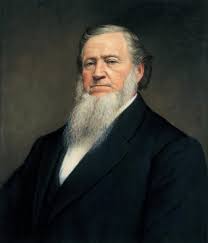Sabbath Quotes 1

Teachings of Presidents of the Church—Brigham Young, p. 145:
On the day after arriving in the Salt Lake Valley, President Brigham Young spoke briefly to the pioneer camp concerning observance of the Sabbath. With a wilderness to tame, crops to be planted, and other pressing work of the time, he informed the brethren...they must not work on Sunday, that (if they did) they would lose five times as much as they would gain by it, and they must not hunt or fish on that day. He remarked that there would be a meeting every Sabbath in this place or wherever we stop (WWJ, 25 July 1847).
By forsaking our field for a season, to gather together to worship our God, I can assure you that our crops will be better than they would be if we were to spend all our time in our fields. We may water and plant and toil, but we should never forget that it is God who gives the increase; and by meeting together, our health and spirits will be better, we will look better, and the things of this world will increase around us more, and we will know better how to enjoy them. (DBY, 167)
We should observe (the Sabbath) for our own temporal good and spiritual welfare. When we see a farmer in such a hurry, that he has to attend to his harvest, and to haying, fence-making, or to gathering his cattle on the Sabbath day, as far as I am concerned, I count him weak in the faith. He has lost the spirit of his religion, more or less. Six days are enough for us to work (see Exodus 20:9-11), and if we wish to play, play within the six days; if we wish to go on excursions, take one of those six days, but on the seventh day, come to the place of worship. (DBY, 165)
Instead of suffering our labors to occupy the Sabbath,...we should do as little as possible; if it is necessary to cook food, do so; but even if that could be dispensed with, it would be better. As to keeping the Sabbath according to the Mosaic law, indeed, I do not; for it would be almost beyond my power. Still, under the new covenant, we should remember to preserve holy one day in the week as a day of rest—as a memorial of the rest of the Lord and the rest of the Saints; also for our temporal advantage, for it is instituted for the express purpose of benefiting man. It is written in this book (the Bible), that the Sabbath was made for man. It is a blessing to him. As little labor as possible should be done upon that day; it should be set apart as a day of rest, to assemble together in the place appointed, according to the revelation (see D&C 59:10-12), confessing our sins, bringing our tithes and offerings, and presenting ourselves before the Lord. (DBY, 164)
Now, remember, my brethren, those who go skating, buggy riding, or on excursions on the Sabbath day—and there is a great deal of this practiced—are weak in the faith. Gradually, little by little, little by little, the spirit of their religion leaks out of their hearts and their affections, and by and by they begin to see faults in their brethren, faults in the doctrines of the Church, faults in the organization, and at last they leave the Kingdom of God and go to destruction. I really wish you would remember this, and tell it to your neighbors. (DBY, 165)
Whether we are poor or rich, if we neglect our prayers and our sacrament meetings, we neglect the Spirit of the Lord, and a spirit of darkness comes over us. (DBY, 170)
We are under the necessity of assembling here from Sabbath to Sabbath, and in Ward meetings, ...to teach, talk, pray, sing, and exhort. What for? To keep us in remembrance of our God and our holy religion. Is this custom necessary? Yes; because we are so liable to forget—so prone to wander, that we need to have the Gospel sounded in our ears as much as once, twice, or thrice a week, or, behold, we will turn again to our idols. (DBY, 165)
The Lord has planted within us a divinity; and that divine immortal spirit requires to be fed. Will earthly food answer for that purpose? No; it will only keep this body alive as long as the spirit stays with it, which gives us an opportunity of doing good. That divinity within us needs food from the Fountain from which it emanated. It is not of the earth, earthy, but is from heaven. Principles of eternal life, of God and godliness, will alone feel the immortal capacity of man and give true satisfaction. (DBY, 165)